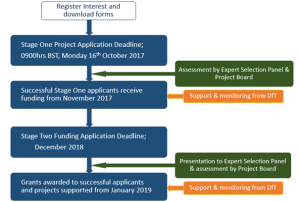

Key Features
The new Hydrogen for Transport Programme (HTP) sets out the next steps to develop the UK hydrogen vehicle market, providing up to £23m of new grant funding until 2020 to support the growth of refuelling infrastructure alongside the deployment of new vehicles.
Programme: Hydrogen Transport Programme (HTP)
Award: Up to £23m
Opens: 17th Aug 2017
Closes: 16th Oct 2017
The HTP was launched by the Office for Low Emission Vehicles (OLEV) and will provide funding via an open competition for both Hydrogen Refuelling Stations (HRS) and hydrogen fuel cell vehicles. The programme will be supported in two stages:
Stage 1 will commit up to £9m to 50:50 match fund around seven HRSs to be completed in 2018/19, plus captive fleets. Funding will commence in November 2017.
Stage 2 will commit up to £14m to fund up to ten HRSs plus captive fleets and will begin in December 2018, subject to market developments over Stage 1.
The funding will allow additional larger capacity HRS to be built, whilst optimising the utilisation of these and existing stations by providing funding to support the purchase of vehicle fleets that can be refuelled at all HRS.
The HTP Programme has two primary objectives:
Stages of the HTP
The following chart details the programme stages and application process.

Important secondary objectives include:
For more information on this programme, please click here.
